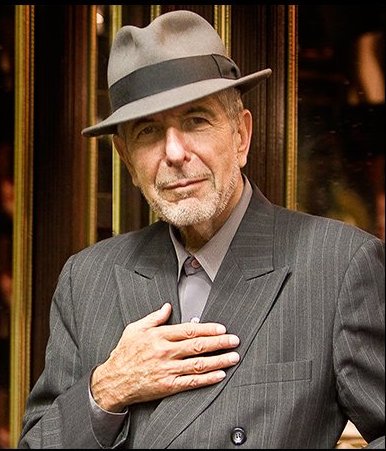 | |
| Leonard Cohen | |
In addition to his renowned musical accomplishments, Cohen published his first poetry collection, Let Us Compare Mythologies, in 1956, while he was still an undergraduate, followed over the years by titles like The Spice-Box of Earth, Flowers for Hitler and Book of Mercy. "Other collections would appear sporadically throughout Mr. Cohen's life, including the omnibus Poems and Songs in 2011," the Times noted. In 2006, he published Book of Longing, a poetry collection that composer Philip Glass "set to music and then took on tour, with Mr. Cohen's recorded voice reciting the words and Mr. Glass's ensemble performing the music." Cohen also wrote the novels The Favorite Game (1963) and Beautiful Losers (1966), the latter of which eventually sold more than three million copies worldwide.
Cohen's best-known song "may well be 'Hallelujah,' a majestic, meditative ballad infused with both religiosity and earthiness," the Times wrote, adding that "some 200 artists, from Bob Dylan to Justin Timberlake, have sung or recorded it. A book has been written about it, and it has been featured on the soundtracks of movies and television shows and sung at the Olympics and other public events."
In the liner notes for the music anthology The Essential Leonard Cohen, author Pico Iyer wrote: "The changeless is what he's been about since the beginning. Some of the other great pilgrims of song pass through philosophies and selves as if through the stations of the cross. With Cohen, one feels he knew who he was and where he was going from the beginning, and only digs deeper, deeper, deeper."
Shelf Awareness
I chanced upon a lengthy, in-depth interview with Cohen only two months ago. His strength-of-purpose, intensity and soulful insight into our human condition shone through.
ReplyDeleteOh to achieve even a tenth of his output!
Vale, as we say.
Or should we shakily sing 'hallelujah' instead?